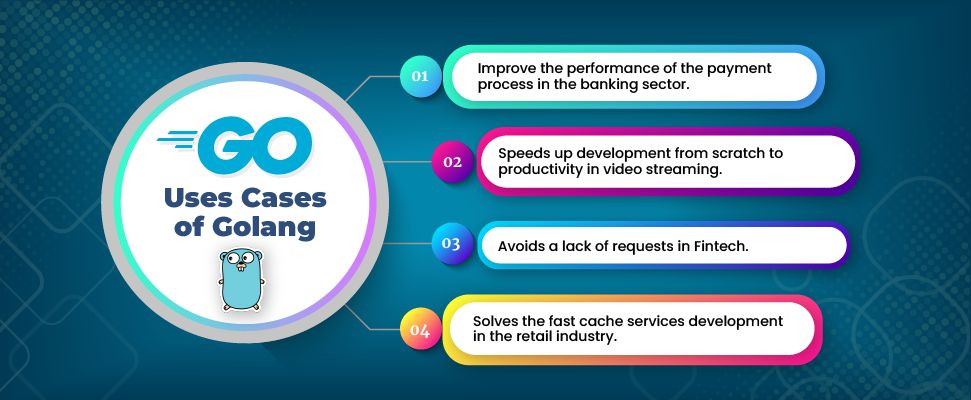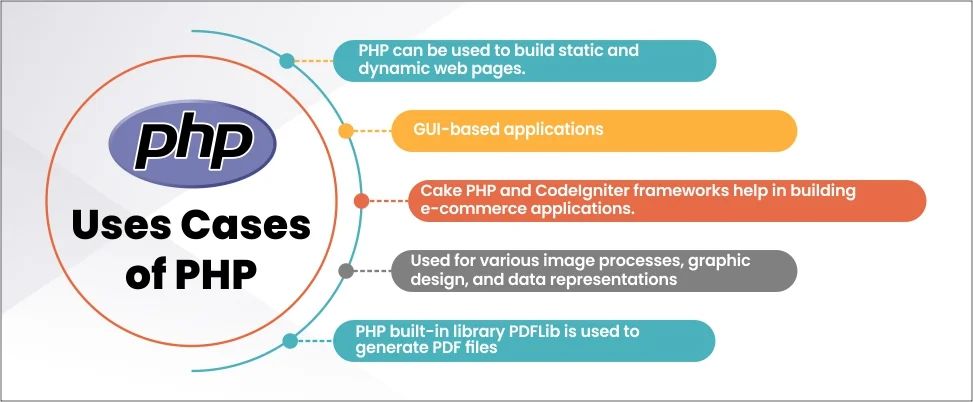Table of Contents
ToggleIntroduction
Golang and PHP have reached the pinnacle of popularity in the world of software development. Why? Both these languages have been widely sought-after by developers and businesses worldwide. Don’t believe? Then check out these statistics: In terms of popularity, PHP has 93 million websites using it, while Go has 18 million. Go or Golang is a relatively new language so it’s behind in the race with PHP. Now, let’s see how does these two programming languages compare in terms of features, use cases, benefits, and more.
What is Golang?
Golang is an open-source statically typed programming language that helps develop web applications and cloud networking services. Golang maintains its prestige of being a concurrent model and having a built-in garbage collector. It resolves issues such as unregulated dependencies, and slow build time, thus, simultaneously helping to overcome difficulties in developing automatic tools, cross-language development, and redundant efforts.
Key Features of Go
- Readability and Maintainability: Go comes with simple yet feature-rich features. It’s simplicity makes it an efficient language for building software for a large codebase.
- Automatic Garbage Collector: This feature helps in efficient memory management and reduces the likelihood of common memory errors.
- Static Typing mechanism ensures accurate compile code, type conversions, and compatibility. Interfaces in Golang promote flexibility in writing cleaner code and code reusability.
- Robust Standard Library: Its standard library and tools simplify the development process without any intervention of third-party packages.
- Cross-platform allows code to compile and run on Windows, MAC, and Linux.
- Go Test Command allows developers to write unit tests alongside application code.
- Trackable Approach with Concurrency Support: This feature uses multi-processor architecture for large applications to scale effectively and also allows developers to free up allocated resources quickly.
- Fast Compilation and Execution Speed helps iteration and testing of code within a second.
Golang Pros & Cons
| ✅ Pros | ❎ Cons |
|---|---|
| Fast execution | Doesn’t come with a generic support function |
| Highly efficient programs | Need to create multiple functions for different parameter |
| Simple and concise syntax | Hard to rewrite code |
| Easy to learn and beginner-friendly | Young ecosystem |
| Documentation support and third-party tools and libraries | Less support in GUI applications |
| Good for large-scale and complex system | Limited libraries |
| Automatic garbage collector frees up memory |
Use cases of Golang

- Improve the performance of the payment process in the banking sector.
- Speeds up development from scratch to productivity in video streaming
- Avoids a lack of requests in Fintech.
- Solves the fast cache services development in the retail industry.

Don't miss out on your chance to work with the best!
Apply for top job opportunities today!
What is PHP?
PHP is an open-source server-side programming language used to create client-side applications. It can run on multiple operating systems and is designed to be compatible with the wide range of servers used in web development. Another key point is that it can be embedded directly into HTML code and interact with databases.
Key Features of PHP
- Open-source features let PHP developers create and modify a vast range of applications without any cost.
- Platform Independent: means it can run on Windows, MAC, and Linux.
- Security: It protects against SQL injection and cross-site scripting (XSS) attacks.
- Versatile Language: PHP developers can create web applications such as social networking sites, e-commerce sites, content management systems, and more.
- Database Support helps store and manage website data, Oracle, MySQL, and PostgreSQL are the databases that PHP supports.
- Simple Syntax makes beginners grasp the language easily.
Related Post: Top PHP Frameworks in 2023
Pros & Cons PHP
| ✅ Pros | ❎ Cons |
|---|---|
| Cost-effectiveness | Inconsistent naming convention creates challenges |
| Good for start-ups and small business | Has numerous security vulnerabilities |
| Support for multiple protocols | Difficult to build an advanced concurrent application |
| Handle high-traffic websites | Limited multithreading support |
| Built-in caching mechanism improves performance | No type checking occurs at compile time |
| Easy deployment | Remote code execution vulnerabilities |
| Comes with frameworks such as Laravel, CodeIgniter, and Symfony | |
| Build scalable applications quickly | |
| Integration with other technologies easier | |
| Easy maintenance and update | |
| Robust ecosystem and tools | |
| Fast and efficient |
Use cases of PHP

- PHP can be used to build static and dynamic web pages.
- CakePHP and CodeIgniter frameworks help in building e-commerce applications.
- GUI-based applications.
- Used for various image processes, graphic design, and data representations.
- PHP built-in library PDFLib is used to generate PDF files.
Performance Comparison: Go vs. PHP
| Go | PHP |
|---|---|
| High performance | Good for small and mid-sized applications |
| Popular apps are Docker and Kubernetes | Popular apps are Facebook, WordPress, Wikipedia |
| Server-side technology type | Server-side, dynamically typed |
| Garbage collectors reduce memory overhead and memory allocation | Caching mechanisms boost the coding process |
| Suitable for distributed systems and network systems | Suitable for dynamic web pages and application |
| Execute code quickly | Executes code by line |
| Written in C and assembly language | Written in C |
| Easy to write concurrent programs | Server-side execution |
| Efficient memory management | Highly scalable and handle high-traffic websites |
| Multicore CUPs handle a large volume of data with ease | Third-party support improves quality |
| Moderate Learning curve | Moderate Learning curve |
Growth of PHP and Golang
Initially, Golang had small, dedicated followers, but with the improvement of garbage collection, it gained massive followers. Its popularity has been attributed to high performance, concurrency, and smoothness. The rise of cloud computing made Golang more sought-after among developers. On top of that, it’s well-designed memory management is great for building microservices and cloud-based applications.
PHP faced competition with Pearl and CGI Script in the early days, but it was already a household name among web developers. Despite all odds, PHP rose to fame because of its effectiveness and simplicity.
All in all, both languages succeeded in gaining popularity in web development, PHP for its ongoing new versions and updates, and Golang for its built-in concurrent and memory management support. The table below shows the popularity over the years.
| Golang | PHP | |
|---|---|---|
| Introduced | 2009 by Google | 1995 |
| Popularity | 2016 gained widespread recognition with the release of 1.6 along with HTTP/2 support | In the mid-2000s, and 2015 gained huge popularity with the release of PHP 7 |
| Ranked | As per the TOBIE Index, ranked 20th in 2017, 11th in 2023 | Uses try, catch, and finally into the pattern |
| Website Usage | 82% use Golang | 78% use PHP for server-side scripting |
Companies that Use PHP and Golang
| PHP | Golang |
|---|---|
| Uber | |
| Alibaba | |
| Flickr | |
| Tumblr | |
| Wikipedia | Medium.com |
| WordPress and Drupal | SoundCloud |
| Trivago | Dropbox |
| Compass | Twitch |
| Spotify | British Broadcasting Corporation(BBC) |
| Slack | Docker |
| Slack | Docker |
| Mailchimp | The New York Times |
| Magento | |
| iStock | |
| Upwork |
Related Post: NodeJS Frameworks for App Development
In Conclusion:
Golang and PHP are widely recognized for building web applications, they both have unique features and strengths. Given that, it’s not easy to say one is superior to another as it depends solely on your project requirements. Both offer the best features and advantages, but they also come with some drawbacks. To sum up, PHP has been around for a long time and is ideal for making dynamic websites. On the contrary, Golang would be the best choice for projects requiring processing power and high traffic volume.
Take control of your career and land your dream job!
Sign up and start applying to the best opportunities!

FAQs
PHP operators are symbols that are used to perform different types of operations. It is of nine types: arithmetic operators, logical or relational operators, comparison operators, conditional or ternary operators, assignment operators, spaceship operators, array operators, increment/decrement operators, and string operators.
The most commonly used PHP string functions are strlen(), str_word_count(), str_replace(), strstr(), substr(), and strtolower().

